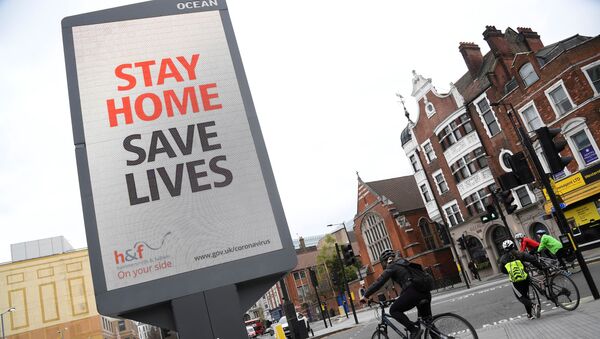“Targeted herd immunity” being included in a list of probable UK government responses to the COVID-19 pandemic appears to directly contradict strong denials by the health secretary just days earlier saying that it was not part of government policy, The Guardian reported citing a documents it has seen.
The planning document, used by NHSX and a technology contractor, British artificial intelligence company Faculty, to set forth the data response to the pandemic, around 23 March proposes a computer simulation of the impact of “targeted herd immunity” as one of the government’s possible “interventions". NHSX didn’t immediately respond to a Guardian inquiry about why “targeted herd immunity” was listed on the digital department’s document as a specific intervention to be simulated.
One of the document's lists titled “scenarios/interventions” up for potential modelling contains “intervention analyses” of policies such as social distancing and school shutdowns, which the government introduced beginning 16 March. Below these, the document features in black and white “targeted herd immunity (only isolate most vulnerable parts of population)".
The document further includes a list of interventions that “require no new simulation dynamics” of the computer modellers - social distancing, school closures, “targeted herd immunity (only isolate most vulnerable parts of population)”, household quarantine, and “area quarantine”.
Lawyers for Faculty suggested the proposed herd immunity simulation was the result of entirely internal, preliminary discussion and never took place. In a statement, Faculty said it was “enormously proud” of the work it was doing for NHSX, the health service’s digital planning division, arguing its “visualisations and forecasts” would allow decision-makers to make faster and more informed decisions. “This work is saving lives", it stressed.
On 11 March, it was revealed that the government might be seeking to arrive at “herd immunity” across the nation when Dr David Halpern, the chief executive of the governmental behavioural insights team - the so-called “nudge unit” - suggested to the BBC that the government was pursuing a policy like the one outlined in the NHSX and Faculty document.
“There’s going to be a point, assuming the epidemic flows and grows as it will do, where you want to cocoon, to protect those at-risk groups so they don’t catch the disease", Halpern said at the time, when there were still no across-the-board closures. "By the time they come out of their cocooning, herd immunity has been achieved in the rest of the population", he explained.
Two days later, on 13 March, the government’s chief scientific adviser, Sir Patrick Vallance, said that obtaining some form of herd immunity, by having potentially 60% of the population (40 million people) contract COVID-19, was one of the “key things we need to do”. However, the following day, Health Secretary Matt Hancock publicly denied the approach, with DHSC issuing public guidance that ruled out herd immunity being “part of our action plan” but stating that “it is a natural by-product of an epidemic".
The latter thereby suggests that, despite the lockdown measures introduced on 23 March, the government does envisage a large proportion of the population contracting COVID-19, then recovering and having immunity, which is expected to prevent the further spread of the virus.
Some medical experts, The Guardian says, assert that in the absence of widespread testing of people and tracking those they come in contact with, this remains the government’s policy: to contemplate most of the population ultimately becoming infected, and eventually achieving herd immunity.
The UK has so far seen over 78,990 confirmed COVID-19 cases, per WHO estimates, with the death toll amounting to more than 9,870.




